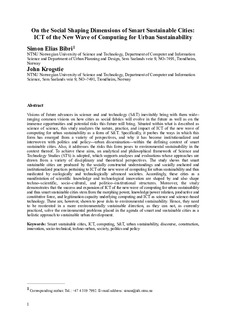On the Social Shaping Dimensions of Smart Sustainable Cities: A Study in Science, Technology, and Society
Journal article, Peer reviewed
Submitted version
Date
2017Metadata
Show full item recordCollections
Abstract
Situated within science of science, this study analyzes the nature, practice, and impact of ICT of the new wave of computing for urban sustainability as a form of science and technology (S&T) within the defining context of smart sustainable cities. Specifically, it probes the ways in which this form has emerged from different perspectives, why it has become institutionalized and interwoven with politics and policy—urban dissemination, as well as the risks it poses to environmental sustainability in the context thereof. To achieve these aims, an analytical and philosophical framework of STS is adopted, which supports analyses and evaluations whose approaches are drawn from a variety of disciplinary and theoretical perspectives. The study shows that smart sustainable cities are discursively construed and materially produced by the socially constructed understandings and socially anchored and institutionalized practices pertaining to ICT of the new wave of computing for urban sustainability. Thereby, such cities are medicated by and situated within ecologically and technologically advanced societies. And as urban manifestations of scientific knowledge and technological innovation, they are shaped by, and also shape, socio–cultural and politico–institutional structures. In addition, the study demonstrates that the success and expansion of smart sustainable cities stem from the transformational power, knowledge/power relation, productive and constitutive force, and legitimation capacity underlying ICT of the new wave of computing for urban sustainability due to its association with the scientific discourse and its societal entailments. This form of S&T is, however, shown to pose risks to environmental sustainability. Therefore, it needs to be reoriented in a more environmentally sustainable direction, as it can not, as currently practiced, solve the complex environmental problems placed in the agenda of smart sustainable cities as a holistic approach to urban development.
